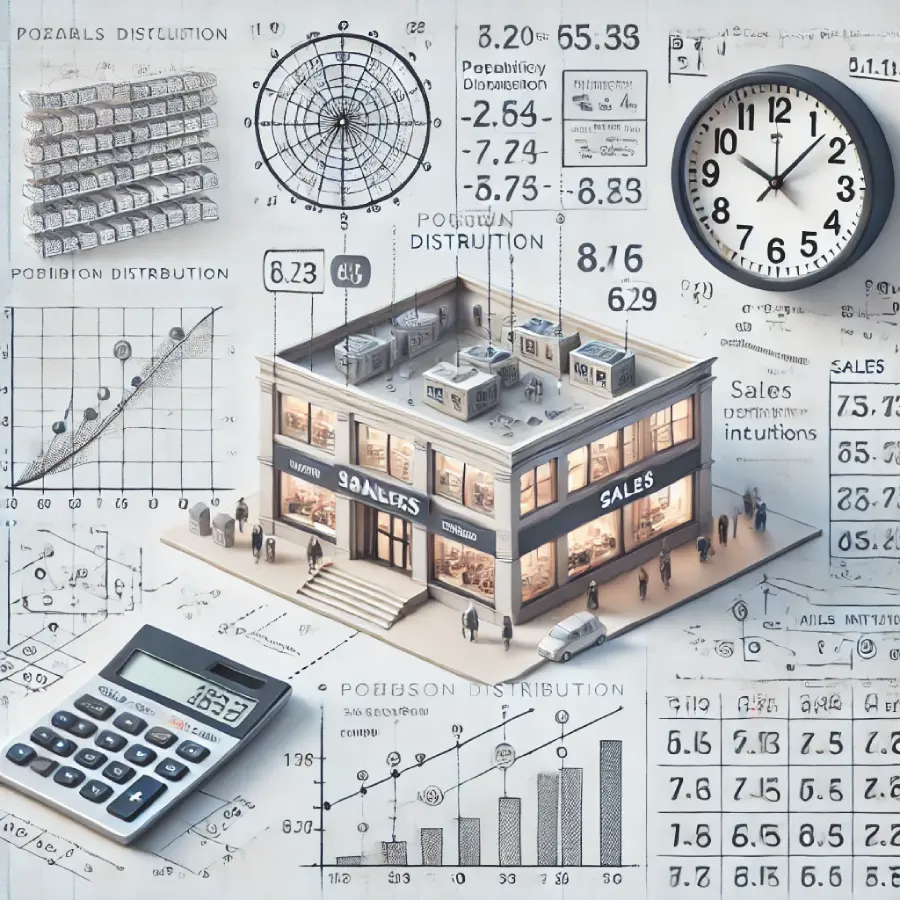Exercise
A department store sells an average of 3 items per hour. Answer the following questions:
1. What is the probability of exactly 3 sales in the next hour?
2. What is the probability of up to 3 sales in the next hour?
3. What is the probability of making no sales in the next hour?
4. What is the probability of up to 3 sales in the next 20 minutes?
Solution
This problem involves a Poisson distribution since we are dealing with the number of events (sales) occurring within a fixed interval of time.
The probability mass function for a Poisson distribution is given by:
\[
P(X = k) = \frac{\lambda^k e^{-\lambda}}{k!}
\]
where:
– \( \lambda \) is the average number of events (in this case, sales) in the given time period,
– \( k \) is the number of events (sales),
– \( e \) is the base of the natural logarithm, approximately equal to 2.71828.
Given:
– \( \lambda = 3 \) (since the average sales per hour is 3)
Question 1: What is the probability of exactly 3 sales in the next hour?
Here, \( k = 3 \):
\[
P(X = 3) = \frac{3^3 \cdot e^{-3}}{3!} = \frac{27 \cdot e^{-3}}{6} = \frac{27}{6e^3} = \frac{9}{2e^3}
\]
Calculating this:
\[
P(X = 3) \approx \frac{9}{2 \times 20.0855} \approx \frac{9}{40.171} \approx 0.224
\]
So, the probability of exactly 3 sales in the next hour is approximately 0.224.
Question 2: What is the probability of up to 3 sales in the next hour?
“Up to 3 sales” means \( P(X \leq 3) \), which is the sum of the probabilities for \( X = 0 \), \( X = 1 \), \( X = 2 \), and \( X = 3 \):
\[
P(X \leq 3) = P(X = 0) + P(X = 1) + P(X = 2) + P(X = 3)
\]
Calculate each:
\[
P(X = 0) = \frac{3^0 \cdot e^{-3}}{0!} = e^{-3} \approx \frac{1}{20.0855} \approx 0.0498
\]
\[
P(X = 1) = \frac{3^1 \cdot e^{-3}}{1!} = \frac{3}{20.0855} \approx 0.1494
\]
\[
P(X = 2) = \frac{3^2 \cdot e^{-3}}{2!} = \frac{9}{2 \times 20.0855} \approx 0.224
\]
\[
P(X = 3) \approx 0.224 \text{ (from Question 1)}
\]
Summing these:
\[
P(X \leq 3) \approx 0.0498 + 0.1494 + 0.224 + 0.224 \approx 0.6472
\]
So, the probability of up to 3 sales in the next hour is approximately 0.647.
Question 3: What is the probability of making no sales in the next hour?
Here, \( k = 0 \):
\[
P(X = 0) = \frac{3^0 \cdot e^{-3}}{0!} = e^{-3} \approx \frac{1}{20.0855} \approx 0.0498
\]
So, the probability of making no sales in the next hour is approximately 0.0498.
Question 4: What is the probability of up to 3 sales in the next 20 minutes?
For 20 minutes, we adjust \( \lambda \) since \( \lambda = 3 \) is for an hour:
\[
\lambda_{20\text{ min}} = 3 \times \frac{20}{60} = 1
\]
Now, calculate \( P(X \leq 3) \) for \( \lambda = 1 \):
\[
P(X \leq 3) = P(X = 0) + P(X = 1) + P(X = 2) + P(X = 3)
\]
\[
P(X = 0) = e^{-1} \approx 0.3679
\]
\[
P(X = 1) = \frac{1^1 \cdot e^{-1}}{1!} = e^{-1} \approx 0.3679
\]
\[
P(X = 2) = \frac{1^2 \cdot e^{-1}}{2!} = \frac{e^{-1}}{2} \approx 0.1839
\]
\[
P(X = 3) = \frac{1^3 \cdot e^{-1}}{3!} = \frac{e^{-1}}{6} \approx 0.0613
\]
Summing these:
\[
P(X \leq 3) \approx 0.3679 + 0.3679 + 0.1839 + 0.0613 \approx 0.981
\]
So, the probability of up to 3 sales in the next 20 minutes is approximately 0.981.
—
Summary of Answers
1. The probability of exactly 3 sales in the next hour is approximately 0.224.
2. The probability of up to 3 sales in the next hour is approximately 0.647.
3. The probability of making no sales in the next hour is approximately 0.0498.
4. The probability of up to 3 sales in the next 20 minutes is approximately 0.981.

